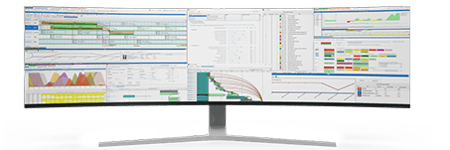Data Management and Big Data
In the industrial manufacturing environment, data is the foundation for making informed decisions that drive efficiency, cost savings, and strategic growth. As a Purchasing Manager, you're at the heart of a complex network of suppliers, inventory management, procurement strategies, and cost control. The sheer volume of data you handle can be overwhelming, but when managed correctly, it becomes a powerful tool that can revolutionize your purchasing operations.
In this blog, we will explore how robust data management and the application of big data analytics can transform procurement in industrial manufacturing. We’ll also look at how integrating advanced systems like PlanetTogether with enterprise resource planning (ERP) systems such as SAP, Oracle, Microsoft Dynamics, Kinaxis, and Aveva can enable better data management, improve visibility, and drive smarter decision-making in procurement.

The Importance of Data Management for Purchasing Managers
As a Purchasing Manager, you are responsible for sourcing materials, negotiating contracts, and ensuring that the right products are available at the right time and price. Each of these tasks generates and relies on vast amounts of data—from supplier performance metrics and pricing trends to inventory levels and demand forecasts.
Effective data management allows you to:
Optimize Procurement Processes: Properly structured data enables you to streamline the procurement process, from supplier selection to order fulfillment. Having reliable, real-time access to data means fewer delays, reduced errors, and more efficient operations.
Improve Supplier Relationships: By leveraging data on supplier performance, delivery times, and quality control metrics, you can foster better relationships with your suppliers. You’ll be able to identify which suppliers consistently meet your expectations and which may need improvement.
Drive Cost Savings: Data-driven procurement decisions help you negotiate better contracts, manage inventory more effectively, and minimize excess or obsolete materials. When you have visibility into historical data, demand forecasts, and market trends, you can make smarter purchasing decisions that reduce costs and increase profitability.
Ensure Compliance and Risk Management: In industrial manufacturing, compliance with regulations and standards is critical. Data management systems allow you to track compliance data in real-time, ensuring that your purchasing practices align with both industry standards and your company's internal policies.

Big Data: Turning Insights into Action
The concept of "big data" goes beyond traditional data management by encompassing the massive amounts of structured and unstructured data generated by industrial manufacturing operations. This data, when analyzed correctly, can provide actionable insights that improve procurement strategies and overall supply chain performance.
Here are some ways big data can enhance purchasing in industrial manufacturing:
Demand Forecasting: Big data analytics can predict future demand by analyzing historical data, market trends, and external factors such as economic conditions and geopolitical events. This enables Purchasing Managers to make more informed decisions about when and how much to buy, reducing the risk of overstocking or stockouts.
Supplier Performance Analysis: Big data provides a granular view of supplier performance, allowing you to evaluate delivery times, quality metrics, and contract compliance. This insight helps in identifying high-performing suppliers and negotiating better terms based on historical data.
Cost Optimization: By analyzing data on pricing trends, raw material availability, and currency fluctuations, big data can help you identify cost-saving opportunities. For example, purchasing materials when prices are low or consolidating suppliers to gain volume discounts can significantly reduce costs.
Risk Mitigation: Big data allows for real-time monitoring of potential risks across the supply chain. For example, if a supplier is experiencing production delays, the system can alert you to potential disruptions so you can adjust your procurement strategy accordingly. This proactive approach helps mitigate risks before they affect your production timelines.


Integrating PlanetTogether with ERP Systems for Better Data Management
While big data holds immense potential, its real value lies in how it’s managed and applied. One of the key challenges in leveraging big data is integrating it across systems to create a unified, accessible, and actionable data environment. This is where advanced planning and scheduling (APS) tools like PlanetTogether, combined with ERP systems like SAP, Oracle, Microsoft Dynamics, Kinaxis, and Aveva, come into play.
PlanetTogether is a powerful APS system that enhances production scheduling, demand forecasting, and inventory management. When integrated with your existing ERP system, it enables more efficient data management across the supply chain, including purchasing operations. Let’s explore how these integrations can benefit your role as a Purchasing Manager:
Integration with SAP: Streamlined Procurement and Supplier Collaboration
SAP is widely recognized for its comprehensive ERP capabilities, including procurement and supply chain management. When PlanetTogether is integrated with SAP, it enables seamless data exchange between procurement and production planning functions.
For example, real-time data from PlanetTogether can provide SAP with detailed production schedules, which helps Purchasing Managers anticipate material requirements more accurately. This eliminates the guesswork in procurement, ensuring that orders are placed based on actual demand rather than forecasts alone. Additionally, the integration allows for real-time supplier collaboration, as changes in production plans are immediately reflected in procurement data, allowing you to adjust purchase orders as needed.
Integration with Oracle: Enhancing Supplier Performance and Cost Control
Oracle’s ERP solutions are known for their strong data analytics and supplier management features. By integrating PlanetTogether with Oracle, Purchasing Managers can take advantage of enhanced visibility into supplier performance and cost data.
For instance, Oracle can track supplier performance metrics such as delivery times and quality ratings, while PlanetTogether provides real-time updates on production schedules and inventory levels. This integration allows you to make data-driven decisions about which suppliers to engage based on their past performance and current capacity. Additionally, you can use historical data to forecast costs and identify trends, helping you negotiate more favorable terms with suppliers.
Integration with Microsoft Dynamics: Real-Time Data Visibility for Smarter Purchasing
Microsoft Dynamics offers flexibility and scalability, making it a popular choice for many industrial manufacturers. Integrating PlanetTogether with Microsoft Dynamics provides Purchasing Managers with real-time data visibility across the entire supply chain.
With this integration, you can track production schedules, inventory levels, and supplier performance all in one place. Real-time data updates from PlanetTogether ensure that your procurement decisions are aligned with actual production needs, reducing the risk of overstocking or stockouts. Additionally, Microsoft Dynamics’ advanced analytics tools allow you to analyze purchasing trends and optimize your procurement strategy for better cost control and supplier management.
Integration with Kinaxis: Aligning Procurement with Supply Chain Planning
Kinaxis is known for its supply chain planning capabilities, particularly in demand forecasting and inventory management. Integrating PlanetTogether with Kinaxis allows Purchasing Managers to align their procurement strategy with real-time supply chain data.
This integration enables you to respond quickly to changes in demand or supply chain disruptions. For example, if there is an unexpected increase in demand, Kinaxis can update the forecast, and PlanetTogether can adjust production schedules accordingly. The procurement team can then use this data to place urgent orders with suppliers, ensuring that production timelines are met without delays.
Integration with Aveva: Leveraging Predictive Maintenance Data for Smarter Procurement
Aveva specializes in operational efficiency and predictive maintenance solutions. When PlanetTogether is integrated with Aveva, it allows Purchasing Managers to incorporate predictive maintenance data into their procurement strategy.
For example, Aveva’s predictive maintenance tools can alert you to potential equipment failures before they occur. This data can be used in conjunction with PlanetTogether’s production schedules to adjust procurement plans in real-time. If a machine is scheduled for maintenance, you can delay purchasing certain materials or adjust order quantities based on production capacity. This ensures that procurement is optimized for both cost and efficiency.

The Future of Data Management and Big Data in Industrial Manufacturing
As industrial manufacturing becomes increasingly data-driven, the role of Purchasing Managers will continue to evolve. Data management and big data analytics will play an even more critical role in optimizing procurement strategies, improving supplier relationships, and driving cost savings.
Looking ahead, advancements in artificial intelligence (AI) and machine learning will further enhance big data capabilities in procurement. AI-driven tools will enable predictive analytics, automated procurement processes, and more accurate demand forecasting, allowing Purchasing Managers to make even smarter, faster decisions.
The integration of systems like PlanetTogether with ERPs such as SAP, Oracle, Microsoft Dynamics, Kinaxis, and Aveva will become more seamless, providing a unified platform for managing procurement, production, and supply chain operations. This integration will empower you to leverage data in new and innovative ways, improving overall efficiency and resilience in your purchasing operations.
As a Purchasing Manager in an industrial manufacturing facility, the ability to manage and analyze data effectively is key to your success. By embracing data management and big data analytics, you can optimize your procurement processes, improve supplier relationships, and drive cost savings.
Integrating PlanetTogether with your ERP system—whether it’s SAP, Oracle, Microsoft Dynamics, Kinaxis, or Aveva—takes data management to the next level. This integration provides real-time visibility, predictive insights, and better decision-making capabilities, enabling you to navigate the complexities of industrial manufacturing with confidence.
In industrial manufacturing, data is more than just numbers—it’s the key to staying competitive, agile, and efficient. The time to invest in robust data management and big data analytics is now, and with the right tools, you can transform your procurement strategy for long-term success.
Are you ready to take your manufacturing operations to the next level? Contact us today to learn more about how PlanetTogether can help you achieve your goals and drive success in your industry.



